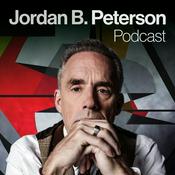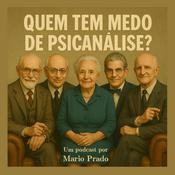91 episódios
- We put love on trial — literally. Drew and I squared off in a full debate over whether romantic love is overrated. I made the case that love is basically your brain's con man, a neurochemical hijacking designed to make you delusional about deeply flawed people, and that the most intoxicating relationships are often the most toxic. Drew fought back with the evidence that love is the foundation of social infrastructure, physical health, and long-term happiness. By the end, we came to a gentlemen’s agreement: a framework that explains why we're all chasing the wrong kind of love, and what the right kind actually looks like.
Ready to stop listening to podcasts and actually start taking action? Join the Solved Community, a group of like-minded people who are taking small steps every day to make big changes in their lives: https://membership.solvedpodcast.com
Sign up for my newsletter, Your Next Breakthrough. It will help make you a less awful person: https://markmanson.net/breakthrough
Check out our sponsors:
IM8: Transform your daily routine with IM8's Daily Ultimate Essentials at https://www.im8health.com/solved
Factor: Head to https://www.factormeals.com/solved202650off and use code solved202650off to get 50% off and free breakfast for a year. Eat like a pro this month with Factor.
Chapters
0:00 Introduction
2:21 Round 1: Love is the Brain's Conman
23:33 Round 2: Love as Social Infrastructure
45:33 Round 3: Love and Happiness
1:07:14 Round 4: We're Drawn to People Who Hurt Us
Learn more about your ad choices. Visit megaphone.fm/adchoices - This is a segment from the full episode on procrastination.
Procrastination isn't a time management problem — it's an emotional regulation problem, and once you see that, everything changes. We break down how your brain uses avoidance as a mood-management strategy, why every philosopher from Plato to the Buddhists was partially right (but nobody had the full picture), and the specific internal and external levers you can pull to actually get shit done. We also run through the six types of procrastinators so you can figure out which flavor of self-sabotage you've been perfecting — plus the RAIN method, minimum viable actions, and why making boring things fun isn't just a nice idea, it's the whole game.
We also put together a free companion guide for the full episode with all the takeaways, references, and tools to help you get your sh*t together once and for all. Download it here: https://solvedpodcast.com/procrastination
Ready to stop listening to podcasts and actually start taking action? Join the Solved Community, a group of like-minded people who are taking small steps every day to make big changes in their lives: https://membership.solvedpodcast.com/
Sign up for my newsletter, Your Next Breakthrough. It will help make you a less awful person: https://markmanson.net/breakthrough
Amazing Offers From Our Sponsor:
Boost your focus with science-backed music from Brain.fm.
Start your 30-day free trial at brain.fm/solved
Chapters:
0:00 Introduction
1:44 Understanding Emotional Regulation
9:34 The RAIN Method
14:04 The Six Types of Procrastinators
23:09 The 80-20 of Procrastination
43:39 Conclusion
Learn more about your ad choices. Visit megaphone.fm/adchoices - Most people aren’t bad at dating, they’re just trying to solve the wrong problem. We treat dating like a personality test (“Am I attractive enough? Confident enough?”) when it’s actually a multi-stage process, and each stage punishes completely different mistakes. That one misunderstanding explains why dating feels so confusing, why men and women keep blaming each other, why dating apps feel brutal, and why so much dating advice makes things worse instead of better.
In this episode of Solved, Drew and I break down why modern dating feels so broken, and why it actually isn’t. We dig into the evolutionary psychology behind attraction, why men and women are optimizing for different things, how modern culture and dating apps amplify the worst parts of the system, and the three stages of dating that almost nobody understands. We also talk about confidence, rejection, status, attraction, and why avoiding rejection is often the very thing sabotaging your dating life. If you’ve felt stuck, burned out, or quietly wondering “what the hell is wrong with dating?” — this episode is for you.
Get your first month of Shopify for only $1 at https://shopify.com/solved
Let Rocket Money help you reach your financial goals faster. Sign up for free: https://www.rocketmoney.com/solved
Ready to stop listening to podcasts and actually start taking action? Join the Solved Community, a group of like-minded people who are taking small steps every day to make big changes in their lives:
We also put together a free companion guide for this episode with all the takeaways, references, and tools to help you get your sh*t together once and for all. Download it here: https://solvedpodcast.com/dating
Sign up for my newsletter, Your Next Breakthrough. It will help make you a less awful person: https://markmanson.net/breakthrough
Chapters:
0:00 Introduction
5:12 Chapter 1: Why Is Dating So Complicated?
11:03 The different challenges men and women face
17:18 Facts
29:51 What Women Find Attractive
38:16 What Men Find Attractive
51:27 Chapter 2: A Brief History of Courtship & Dating
1:06:10 Modern Dating
1:11:41 A Glimmer of Hope: The emerging offline renaissance
1:21:37 Chapter 3: Men's and Women's Dating Advice Ecosystems
1:31:13 Inside the Male Advice Ecosystem
1:44:52 Inside the Female Advice Ecosystem
2:02:07 The Collision: Feedback Loops That Break the Market
2:21:27 Chapter 4: The Pre-Dating Phase
2:36:22 Building Confidence
2:37:59 Halo Effect
2:53:20 Conclusion Pre Dating
2:57:48 Chapter 5: Meeting People and Getting Dates
3:11:17 Flirting
3:23:15 Reading People
3:29:51 Chapter 6: Going on Dates
3:38:39 Trustworthiness
3:47:09 Conversational Skills
3:56:12 Emotional Regulation
4:03:03 Boundaries
4:09:07 F**k yes or no
4:14:44 The 80/20
Learn more about your ad choices. Visit megaphone.fm/adchoices - Most people think ego is either something you need to kill off entirely or inflate to take over the world. Both are wrong. In this episode, we dig deep into what ego actually is—how it evolved, why it matters, and how it secretly runs your life without you realizing it.
We hit Freud, Buddhism, David Hume, Jung’s shadow self, and even the Navy SEALs to unpack why your ego isn’t always the enemy—it’s mostly just misunderstood. Then we get into how to quiet your ego without losing your identity, and yes, we talk psychedelics, too. This is everything you were never taught about ego—but should’ve been.
Head to https://www.80000hours.org/solved to start planning a career that is meaningful, fulfilling, and helps solve one of the world’s most pressing problems.
We also put together a free companion guide for this episode with all the takeaways, references, and tools to help you get your sh*t together once and for all. Download it here: https://solvedpodcast.com/ego
Ready to stop listening to podcasts and actually start taking action? Join the Solved Community, a group of like-minded people who are taking small steps every day to make big changes in their lives: https://membership.solvedpodcast.com
Chapters:
0:00 Introduction
3:31 Chapter 1: Defining the Indefinable — What Is the Ego?
3:33 Napoleon + Gary Snyder
10:15 The Architecture and Function of the Ego
27:15 What is a Healthy Ego?
36:14 The Philosophical Divide: Two Cultures, Two Selves
49:29 Chapter 2: The Ego’s Evolutionary Architecture — How Evolution Built the Self
49:33 Why Evolution Invented “I”
51:46 The Architecture of the Ego: From Refl ex to Reflection
1:00:33 The First Fall: When Knowing Became Our Burden
1:09:07 Why Evolution Built the Ego
1:13:08 Chapter 3: When the Ego Becomes a Tyrant
1:13:20 The Anatomy of Ego Tyranny
1:19:05 Recognizing and Disarming the Inner Dictator
1:47:29 Chapter 4: The Quiet Ego — Beyond a Strong Ego
1:47:34 When Quieter Means Stronger
1:50:58 The Science and Structure of the Quiet Ego
1:57:16 Cultivating a Quiet Ego
2:01:08 Benefits of a Quiet Ego
2:04:27 Chapter 5: The Chemical Dissolution: Ego Death and Psychedelics
2:23:16 Chapter 6: 80/20
shkECPrjbjEMTBrJsUFw
Learn more about your ad choices. Visit megaphone.fm/adchoices - This is probably the most comprehensive, no-BS breakdown of boundaries you're going to find anywhere. We cover what boundaries actually are (spoiler: it’s not just telling people to f*ck off), why they matter more than you think, and how your entire life—your relationships, mental health, identity, even career—is quietly shaped by whether or not you have them.
By the end of this, you’ll know exactly how to set boundaries, how to enforce them without being a jerk, and how to stop confusing your preferences, rules, and passive-aggressive texts for actual emotional maturity. Plus, we talk about how the internet has totally mangled this concept and what to do instead. If you’ve ever felt burned out, resentful, overwhelmed, or just vaguely annoyed by everyone around you, this is for you.
We also put together a free companion guide for this episode with all the takeaways, references, and tools to help you get your sh*t together once and for all. Download it here: https://solvedpodcast.com/boundaries
Ready to stop listening to podcasts and actually start taking action? Join the Solved Community, a group of like-minded people who are taking small steps every day to make big changes in their lives: https://findmomentum.com/boundaries
Sign up for my newsletter, Your Next Breakthrough. It will help make you a less awful person: https://markmanson.net/breakthrough
Chapters:
(0:00) Introduction
(1:29) CHAPTER 1: Foundations of Boundaries
(2:05) The Breakdown: What boundaries actually are (and aren’t)
(4:42) The Spectrum: Porous, Rigid, Healthy
(9:06) Boundaries vs. Values, Rules, Preferences, and Requests
(13:32) What happens when boundaries erode?
(18:46) The Solution: Boundaries as structure and freedom
(22:57) CHAPTER 2: Boundaries: Freedom Through Limitation
(25:09) Creativity with Limitations
(29:15) Mental Health and Limitations
(38:53) Example
(42:54) Boundaries and Maturity
(45:20) CHAPTER 3: Why Boundaries Matter
(50:00) The Basis of Boundary Formation: Values
(58:30) Translating Values into Boundaries
(1:04:06) The Application: Living Your Valued Boundaries
(1:10:14) CHAPTER 4: Why We Fail to Set and Maintain Boundaries
(1:11:11) Developmental Origins
(1:22:53) Personality and Individual Differences
(1:29:48) Emotional Regulation and Mental Health
(1:46:06) CHAPTER 5: Types of Boundaries
(1:46:53) Physical Boundaries
(1:49:28) Emotional Boundaries
(1:51:44) Intellectual Boundaries
(1:56:02) Time Boundaries
(2:00:03) Digital Boundaries
(2:09:01) Financial Boundaries
(2:12:42) Family boundaries
(2:18:52) Friendship Boundaries
(2:23:06) Work Relationship Boundaries
(2:28:22) Boundaries around authority
(2:30:02) Self Boundaries
(2:34:39) Chapter 6: How to Set and Maintain Boundaries
(3:13:37) Chapter 7: Boundaries in Romantic Relationships
(3:30:52) Parenting
(3:37:04) Research & Frameworks
(3:40:44) Western Romance
(3:44:48) CHAPTER 8: The 80/20 of Boundaries
Reset Your Brain with BrainFM: brain.fm/IDGAF
Learn more about your ad choices. Visit megaphone.fm/adchoices
Mais podcasts de Ensino
Podcasts em tendência em Ensino
Sobre SOLVED with Mark Manson
New episodes every Wednesday. Mark Manson is a three-time #1 New York Times bestselling author and 20-year personal development industry veteran. Solved is the most comprehensive, evidence-based, overly-researched podcast on the planet to help you get an issue in your life, err... solved.
Site de podcastOuça SOLVED with Mark Manson, Learning English Conversations e muitos outros podcasts de todo o mundo com o aplicativo o radio.net
Obtenha o aplicativo gratuito radio.net
- Guardar rádios e podcasts favoritos
- Transmissão via Wi-Fi ou Bluetooth
- Carplay & Android Audo compatìvel
- E ainda mais funções
Obtenha o aplicativo gratuito radio.net
- Guardar rádios e podcasts favoritos
- Transmissão via Wi-Fi ou Bluetooth
- Carplay & Android Audo compatìvel
- E ainda mais funções

SOLVED with Mark Manson
Leia o código,
baixe o aplicativo,
ouça.
baixe o aplicativo,
ouça.







































